One of my fellow writers @ Android Coliseum posted some comparisons behind made about carrier prices in Canada.
In summary, Canadians are still quite upset that the pricing is so high compared to other countries. The “big three” keep charging obscene amounts for data usage and lowering the fees for voice and text. Meanwhile, the popularity of voice and text is on the decline, with data use on the incline. It just screams greed.
The recently leaked mobile plan comparison chart showing the high costs of Canadian cell phone plans compared to other countries has sparked outrage and reignited calls for increased competition. The viral Reddit post with over 550 comments laments the continuation of a familiar pattern – the “Big Three” telecom giants Rogers, Bell, and Telus raising prices in lockstep while resisting disruption of their oligopoly.
Canadians pay some of the highest prices among advanced economies for mobile data, which has become the most in-demand component of wireless plans. The telecoms persist in their unpopular practice of charging exorbitant fees for data while lowering costs for declining legacy services like voice calls and SMS text messaging. Critics accuse them of clinging to an outdated business model that exploits a captive customer base.
Industry defenders argue the higher prices reflect the costs of building networks across Canada’s huge geography and low population density. But consumers question why the Big Three’s regional carrier competitors like SaskTel and MTS in the prairie provinces can offer cheaper, more innovative plans that better meet diverse needs.
The lack of variation in national pricing and packages suggests an implicit cooperation to maintain the status quo rather than genuine competition. Though no hard evidence of collusion has emerged, the companies have developed means like signalling upcoming price hikes to influence each other’s strategies outside of direct communication.
For example, Telus announcing a new fee for incoming texts in the past seemed to serve as a prompt for the other major players to quickly follow suit. The result is a market divided regionally rather than on product or price differentiation, with little incentive for disruption. Unless regulators step in or a foreign giant like Verizon enters the market as it once threatened, Canadians await relief from world-leading wireless bills.









